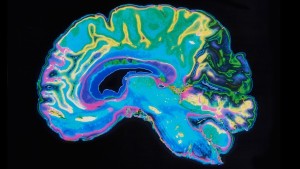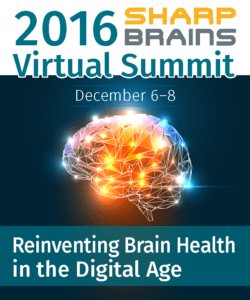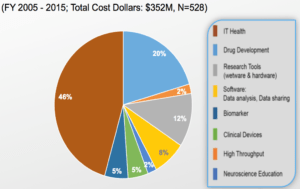Survey of key scientific, technological and investment trends revolutionizing Brain Health in our Digital Age
 —–
—–
Last year I got very interested in the functioning of the human brain and the science behind mindfulness and learning [1], so was quite excited to attend the SharpBrains Virtual Summit [2] in December, indulging in the latest trends in applied neuroscience and digital innovation.
The Summit focused on the theme of reinventing brain health in the digital age, and brought together leading researchers, entrepreneurs, financiers and policymakers passionate with the mission of moving neuroscience and cognitive research from science labs towards applications in Health, Wellness and Education. Here’s a summary of the many things I discovered.
Brain Health is ripe for a deep transformation via digital platforms and tools
Consider all the following brain health and mental health priorities along the lifespan.
Cognitive disabilities in children are growing significantly, from ADHD and OCD, to autism. Autism Spectrum Disorders are prevalent in 1 in ~60 children and the related emotional and economic burden is substantial — yet, over 60–70% of those with treatment have poor adult outcomes, as shared by Dr. Gahan Pandina from Janssen Pharmaceuticals (a company of Johnson & Johnson).
Depression, stress, anxiety and addictions: Depression is a common mental disorder – globally, estimated 350 million people of all ages suffer from depression. According to WHO, depression is the leading cause of disability, and is a major contributor to global burden of disease and suicides. Substance abuse disorders are a national crisis in the US–around 21 million Americans have a substance use disorder–and despite significant funding for prevention and treatment the relapse rate is over 80%.
Cognitive impairments due to PTSD, traumatic or acquired brain injury, and concussions, pervade through millions of veterans and practitioners of high-contact sports. Yet diagnosis and treatments are often elusive, as systematic monitoring and brain scans are not as extensively used as they should.
Aging-related cognitive decline: With advances in public health and medicine helping extend our lifespans, a similar effort is required to boost the cognitive functions of an aging population. The need and the opportunity is immense: According to estimates by Baycrest in Canada, delaying the onset of dementia by two years alone would lead to savings of over $200 billion.
Dr Sandra Chapman from the UT-Dallas BrainHealth Institute helped connect all the dots and argued persuasively that there is no cause more urgent, and no economic driver more powerful, than to help deliver and scale brain health innovations to enhance how people think, work and live.
 She stressed the argument that benefits of deployment of techniques to address brain health no longer need to be confined to the population suffering from impairments or decline of cognitive functions, but should be utilized to empower people of all ages maximize functioning. To support her case, Dr. Chapman presented some eye opening facts about how healthy adults, through moderate doses of relevant training, could enhance blood-flow to the frontal lobes by 12%, and increase frontal lobe connectivity by 30%, which is significant since this is the part of the brain supporting complex problem solving, novel thinking, emotional intelligence, judgement & decision making, agility & flexibility and strategic leadership – the top skills in the age of the Fourth Industrial Revolution described by the World Economic Forum and others.
She stressed the argument that benefits of deployment of techniques to address brain health no longer need to be confined to the population suffering from impairments or decline of cognitive functions, but should be utilized to empower people of all ages maximize functioning. To support her case, Dr. Chapman presented some eye opening facts about how healthy adults, through moderate doses of relevant training, could enhance blood-flow to the frontal lobes by 12%, and increase frontal lobe connectivity by 30%, which is significant since this is the part of the brain supporting complex problem solving, novel thinking, emotional intelligence, judgement & decision making, agility & flexibility and strategic leadership – the top skills in the age of the Fourth Industrial Revolution described by the World Economic Forum and others.
What is critical to recognize, then, is the potential to engage everyone (not just a few narrow clinical populations) via digital brain health platforms and tools.
Digital brain health is attracting sizable private and public funding
1. Snapshot of private funding
Also at the Summit there were multiple presentations from digital health entrepreneurs and investors discussing approaches to revolutionize mental health and brain health in areas such as ADHD, substance abuse, and general brain performance.
Edward Kliphuis from Merck Ventures–an evergreen $300m digital health fund backed by Merck– explained how the pharma giant is seeking to work towards improving patient outcomes targeting investments in digital and platform technologies that enable Assessment, Intervention and Treatment, and has five investments in neurology-related companies, including a sizable one in Akili Interactive Labs.
In turn, Dr. Eddie Martucci at Akili Interactive Labs described how they have been building a platform with the emphasis on cognitive therapeutics through gamification. Their vision is to have FDA-approved monitoring and treatment environments that certify the validity of efficacy against mental health issues such as ADHD, Autism Spectrum Disorders, Sensory processing, depression, Alzheimers, dementia, Parkinson’s disease.
Similarly, we learned how Pear Therapeutics is developing app-based monitoring and gamification to tackle challenges such as substance abuse disorder, PTSD, anxiety, Insomnia, traumatic injury, and ADHD, in partnership with various labs and pharma companies, with the intention to reduce costs and ensure a higher patient retention. Pear is backed by Jazz Ventures and its products are in the process of securing regulatory approval.
Another exciting start-up, MindMaze, raised US$100M in 2016. MindMaze is working on using virtual reality (VR), augmented reality (AR), computer graphics, brain imaging & neuroscience to treat patients with patients with brain injuries, stroke victims, spinal cord injury and amputee patients who may have lost cognitive control of their limbs – and a couple of company representatives shared a fascinating update of their current and future solutions in this domain.
To round things up, private investor Charlie Hartwell at Bridge Builders Collaborative shared his lessons learned supporting firms in the mind training and mindfulness space, prioritizing investments in scalable enterprises that help people connect deeply with themselves and consider mind-training as important as physical fitness. Their portfolio, for example, includes pioneers such as Interaxon (developer of EEG headband Muse), Pear Therapeutics, eMindful, Happify, Claritas and Headspace.
2. Snapshot of public funding in the US and Canada
We also heard about the growing investments from public sources, both in the US and Canada.
Dr. Margaret Grabb, who runs funding initiatives at the National Institute of Mental Health (NIMH) shared key insights about the Small Business Innovation Research Program (SBIR) and Small Business Technology Transfer Research Program (STTR), two funding programs for start-ups helping commercialize research findings and platforms.
- For SBIR, NIMH has set-aside $41m for FY17 alone.
- For STTR, the FY17 allocation is $5.7m.
The National Institute of Mental Health has a goal to transform understanding and treatment of mental illnesses through basic and clinical research, helping pave the way for prevention, recovery and cure. Interestingly, the majority of funding since 2005 has been aimed at supporting IT-related initiatives: out of the portfolio of US$325m and 528 investments, 46% are in IT, 20% in Drug development, 12% in Research Tools, 8% in Software for data analysis and sharing.
Dr. Grabb also described the experiences of several beneficiaries of past funding, including Cogito Corp, Think Now EEG, Behavior Imaging Solutions, and Xhale inc, and her insights were perfectly complemented when Rex Jakobovits from Experiad shared his previous experience launching Vivalog (acquired by McKesson) and how non-dilutive NIMH funding helped him build one of the world’s largest internet repository for brain imaging scans.
Up north, it was exciting to hear from Ron Riesenbach–VP of Innovation at the Canadian Centre for Aging & Brain Health Innovation (CC-ABHI). Based in Toronto, Baycrest recently secured five year funding of $124m from the Governments of Canada and Ontario, industry and various donors to build the new Canadian Centre for Aging & Brain Health Innovation (CC-ABHI), with a mission to accelerate, innovate and drive adoption of proven brain health products. For starters, they have already announced funding programs aimed at addressing these four critical priorities:
- Increase innovation at point of care – $50k grants through SPARK program to enable front-line health workers to experiment and invent new ways to deliver care.
- Scientific evidence – through Industry Innovation Partnership, access to up to $600k grants to evaluate products and services, providing companies with objective feedback on their innovation effectiveness. For example, Ron outlined the Cogniciti case study.
 Diffusion of promising science to clinical teams – Clinician and Scientist Partnership supports up to $600k per grant to accelerate promising solutions reaching the bedside.
Diffusion of promising science to clinical teams – Clinician and Scientist Partnership supports up to $600k per grant to accelerate promising solutions reaching the bedside.- Mobilizing knowledge & driving adoption – Knowledge mobilization program uses advanced educational approaches to engage clinicians, learners and supports them in their testing and adoption of new tools.
With both private and public investments backing research-based entrepreneurship in the digital brain health space, the future does look sharper and healthier.
Next week I’ll share a new article via SharpBrains.com describing in more depth the emerging neurotechnologies–especially targeted towards consumers–that blew my mind at the 2016 SharpBrains Virtual Summit and at CES 2017 a few weeks ago.
 – Apoorv Mathur is passionate about creating new products fueled by the latest technologies to augment human potential. An industrial engineer from IIT Delhi (B.Tech.) with a Masters in Operations Research, he is currently pursuing management studies at INSEAD and Wharton.
– Apoorv Mathur is passionate about creating new products fueled by the latest technologies to augment human potential. An industrial engineer from IIT Delhi (B.Tech.) with a Masters in Operations Research, he is currently pursuing management studies at INSEAD and Wharton.
Notes:
- 1. Several people sparked my curiosity: friend Mayank Garg encouraged my own experimentation with meditation; I noticed a very interesting start-up–PsyInnovations–from IIT Alum Ritvik Singh; my colleague Naheema at INSEAD is refining schools with new science of learning; Gunjan Agrawal–founder of SchoolCountry–is upgrading math education to be fun; I teamed up with Naoto at INSEAD to pitch an idea for intelligent assistance to the elderly in Japan, and have had multiple fascinating conversations with friend Nilesh. Thanks to all for helping in my exploration and discovery.
- The conference is put together annually by Álvaro Fernández Ibáñez, CEO of SharpBrains, who is also the Member of the Council on the Future of Human Enhancement at the World Economic Forum. He kindly offered a press pass to help me attend the conference and contribute a 2‑part report from it.
Related articles:



